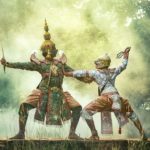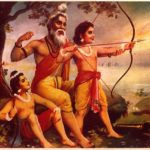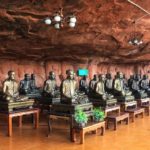Nang Kwak: Thailand Goddess of Wealth & Good Luck
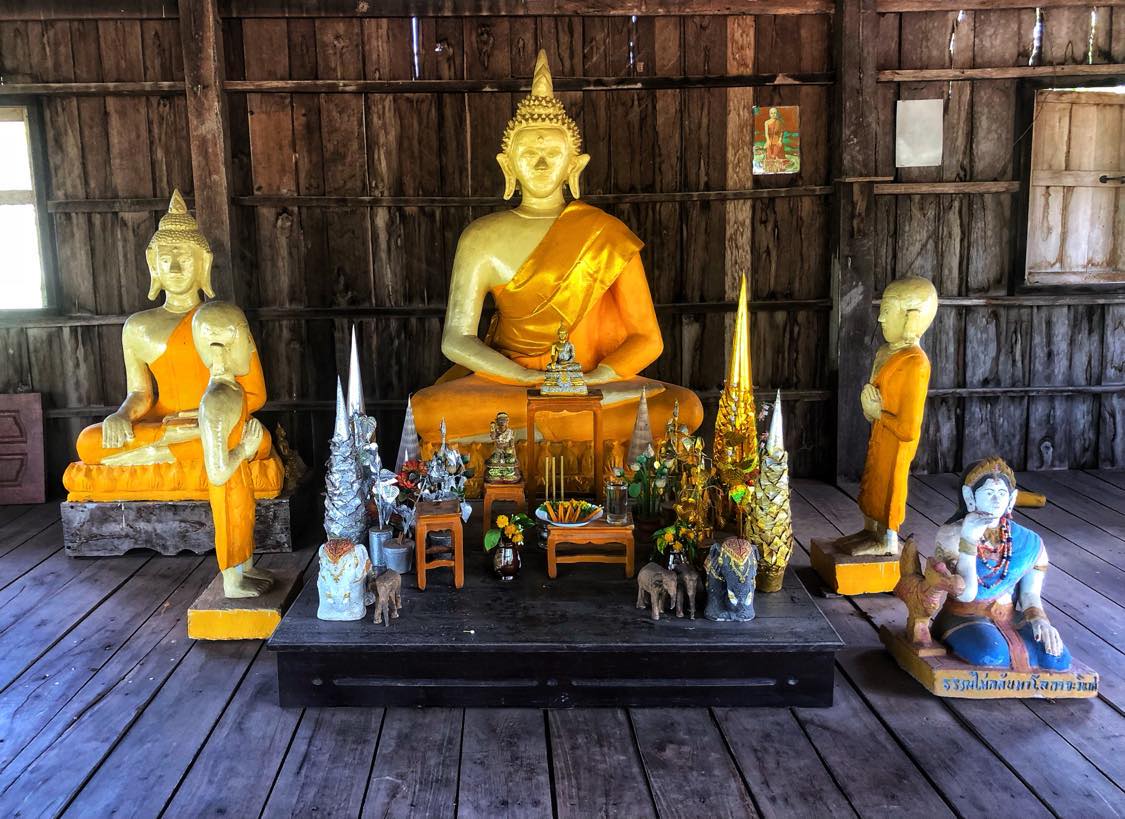
Nang Kwak (นางกวัก) is a revered figure in Thai folklore and popular culture. She often is called the Goddess of Wealth & Good Luck or the Patron Saint of merchants and Thai shop owners. While she is not worshiped universally by all Thais, statues, figurines, and posters of her can be seen in offices and houses throughout Thailand, as well as in a few Thai temples. Her history stretches back many centuries, making her an ancient and deeply ingrained part of Thai traditions.
Depictions of Nang Kwak in Thai Culture
Representations of Nang Kwak can be found in various forms in Thailand, each carrying specific symbolism and significance. Nang Kwak is typically depicted as a graceful and elegant young woman, often dressed in traditional Thai attire. Her appearance is consistent across various representations, and she is recognizable by the following features:
Posture and Gesture: Nang Kwak is commonly portrayed with her right hand raised and pointing forward. The pose of the hand and arm looks somewhat like a snake, but this is seen as a welcoming or beckoning gesture in Thai culture. The gesture thus symbolizes Nang Kwak’s ability to attract good fortune, wealth, and success, making her an auspicious figure for businesses and merchants.
Money Bag: Nang Kwak often is depicted with a money bag in her left hand. This bag signifies her role as the bestower of prosperity and financial abundance. It represents the blessings of wealth that she brings to those who honor and venerate her.
Sitting or Kneeling Position: Nang Kwak is usually depicted in a sitting or kneeling position. This posture conveys her approachability and receptiveness to the needs and prayers of devotees. It also reflects her role as a patron saint for merchants and her willingness to support their endeavors.
Traditional Thai Costume: Nang Kwak’s attire is inspired by traditional Thai clothing, which enhances her cultural significance and ties her closely to the country’s heritage. Her clothing may vary in color and design, but it generally reflects the elegance and grace of Thai culture.
Golden Crown: Another common feature of Nang Kwak’s depiction is the golden crown she wears on her head. The crown symbolizes her divine status and association with wealth, making her a powerful figure for invoking prosperity and fortune.
Offerings: In various shrines and altars dedicated to Nang Kwak, devotees offer various items such as incense sticks, flowers, soft drinks, water, and sweets. These offerings are made as a sign of respect and devotion to seek her blessings and favors.
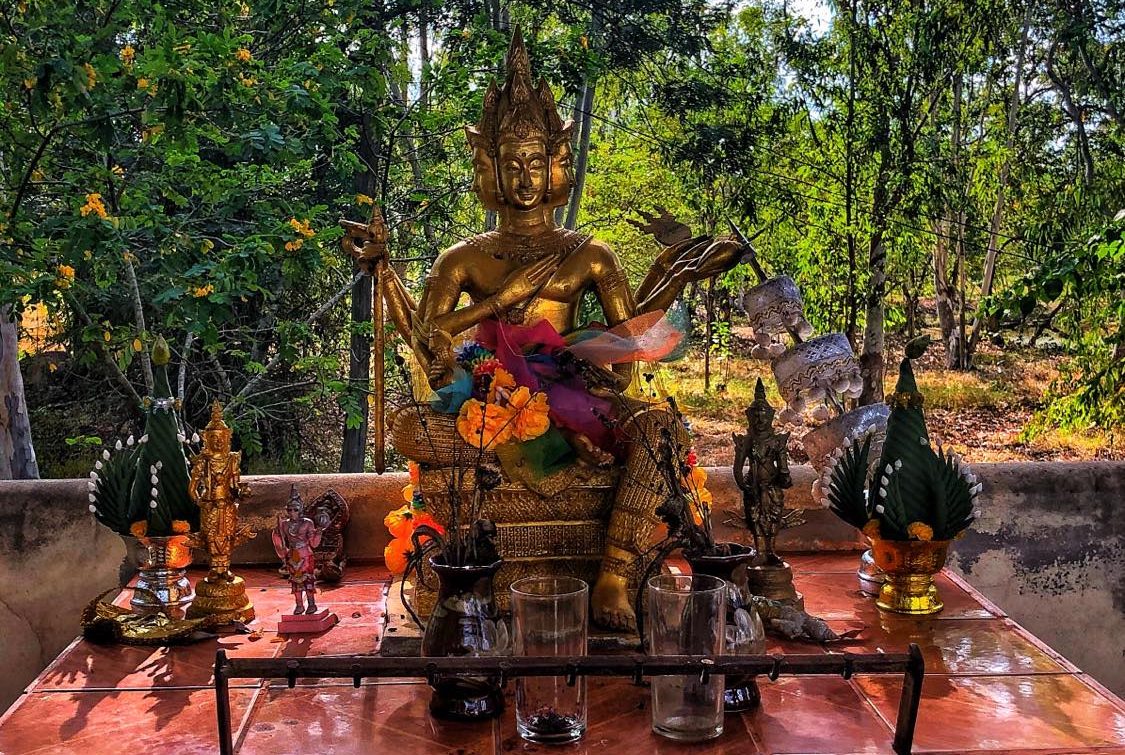
Mythological Figures Associated with Nang Kwak
In Thai culture, Nang Kwak is often associated with several other traditional figures and deities, from Buddhism, Hinduism, and local folklore. These mythological figures include:
Phra Phrom (Four-Faced Buddha): Nang Kwak is sometimes depicted in proximity to Phra Phrom (พระพรหม), the Four-Faced Buddha. Phra Phrom is an important deity in Thai Buddhism, representing wisdom, compassion, and the four directions. When Nang Kwak is situated near Phra Phrom, it symbolizes the convergence of wealth and good fortune with wisdom and divine guidance.
Mae Nang Kwak (Mother Nang Kwak): In some areas, Nang Kwak is referred to as “Mae Nang Kwak,” emphasizing her maternal and nurturing qualities. This association highlights her role as a protector and benefactor, particularly in matters related to family, home, and well-being.
Chao Mae Tuptim: Chao Mae Tuptim (เจ้าแม่ทับทิม) is a revered spirit associated with fertility and prosperity. In certain contexts, Nang Kwak’s representation may overlap with Chao Mae Tuptim, especially in the context of bestowing blessings related to fertility, family, and abundance.
Guanyin (Goddess of Mercy): As the Goddess of Mercy and Compassion, Guanyin (กฺวันยิน) or Chao Mae Guan Im (เจ้าแม่กวนอิม) is associated with benevolence and protection. Nang Kwak’s association with her signifies the compassionate nature of her blessings and the safeguarding of devotees.
Mae Po Sop (Goddess of Rice): In rural Thailand, Nang Kwak often is linked to Mae Po Sop (แม่โพสพ), the Goddess of Rice. This association emphasizes her role in ensuring bountiful harvests, agricultural prosperity, and abundance.
The Legend of Supawadee & Nang Kwak
According to one legend, Nang Kwak is the Thai representation of Supawadee, who was worshiped by early Brahmin merchants in Thailand. Supawadee was the daughter of an Indian businessman named Sujidtaprahma. During her father’s business trips, Supawadee encountered two enlightened monks, who blessed her family with religious teachings of the Buddha, and inspiring her to convert to Buddhism. As a result, the family’s business flourished, and they gained wealth. After her parents’ passing, Supawadee continued the business and earned a reputation for bringing good luck and success to those who prayed to her.
It’s said that the legend of Supawadee spread across Thailand as Buddhism and the Hindu Brahmin faith made their way into the region. Brahmins are believed to have brought statues of Supawadee in the form of a young girl sitting on a cart. Thai people observed the Brahmins’ business success and adopted Supawadee, transforming her into Nang Kwak.
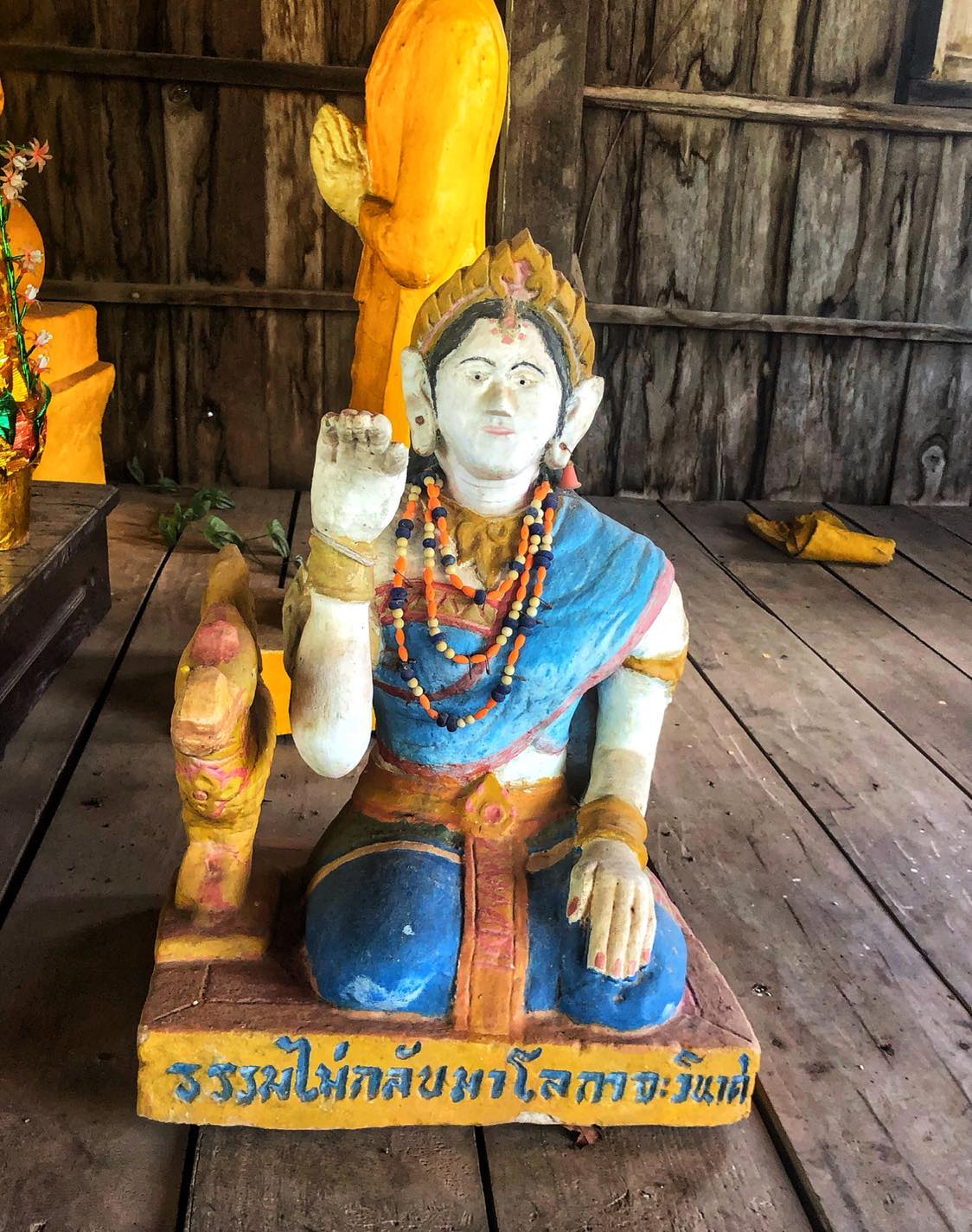
Thai Temples with Nang Kwak Statues
Nang Kwak doesn’t appear at Thai temples as frequently as other mythological figures. In fact, her appearance is rare. However, there is a nice representation of her at Wat Phra Prang Muni, which is located on the banks of the Lopburi River in the province of Sing Buri. There is also a curious old statue of her at the Ban Phon Bok Monastery in Sakon Nakhon. At the base of this statue there is an inscription which reads: ธรรมไม่กลับมาโลกาจะวินาศ (If the Dharma does not return, the world will perish), which shows that Nang Kwak is a figure who beckons not only financial wealth toward us, but spiritual wealth too.
- Affirmations in Buddhism & Thailand - June 7, 2025
- Speak Thai Naturally Without the Gymnastics - April 20, 2025
- The Best Learn Thai Podcast and YouTube Channel - April 10, 2025

